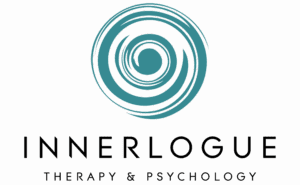Grieving the loss of a loved one is one of life’s most difficult experiences. Even when expected, loss often arrives with a wave of emotions that can be confusing, overwhelming, and at times, isolating. While grief is a natural response to loss, it’s not something you have to go through alone.
At Innerlogue Therapy in Calgary, our team of experienced clinicians offers grief counseling that provides compassionate, evidence-informed support tailored to your needs. Whether you’re navigating the early stages of grief or struggling with complicated emotions long after a loss, therapy can help you process, understand, and begin to heal.
What Is Grief?
Grief is a personal and multifaceted response to loss. While most commonly associated with death, grief can also follow other life events—such as the end of a relationship, loss of a job, or a significant life transition. The emotional experience can include sadness, anger, guilt, disbelief, and anxiety. It may also involve physical symptoms like changes in sleep, appetite, or energy levels. Grief doesn’t follow a strict timeline. Some people begin to adjust within a few months, while others find the process unfolds over a longer period. There’s no “normal” way to grieve—what matters is that you’re supported through it.
Types of Grief
Grief is not one-size-fits-all. Here are some common types individuals may experience:
Complicated Grief
This occurs when the grieving process becomes prolonged or more intense than expected. Symptoms might include persistent longing, emotional numbness, avoidance of reminders, or difficulty engaging in daily life. Complicated grief can benefit from targeted therapeutic support.
Traumatic Grief
Losing someone in a sudden, unexpected, or violent way—such as through an accident or traumatic event—can result in traumatic grief. Individuals may experience flashbacks, nightmares, or heightened emotional distress. Trauma-informed counseling can provide both safety and structure for healing.
Physical Responses to Grief
Grief can also take a toll on the body. Some individuals experience what’s known as broken heart syndrome, a stress-induced condition that temporarily affects heart function. Others might notice fatigue, headaches, or changes in digestion—all of which are valid and common grief responses.
Grief or Depression?
The symptoms of grief and depression can overlap, but they are not the same. Grief often includes waves of sadness tied to reminders of the loss, whereas depression tends to be more persistent and pervasive. However, grief can sometimes trigger a depressive episode, especially if a person has a history of mental health concerns.
If you’re unsure whether you’re experiencing grief or something more, speaking to a mental health professional can offer clarity and guidance.
What Is Grief Counseling?
Grief counseling (also called bereavement counseling) is a therapeutic approach that helps individuals cope with and adapt to loss. A trained therapist offers a supportive environment to process emotions, explore memories, and develop coping strategies that align with your personal experience.
At Innerlogue Therapy, grief counseling is tailored to your pace. Whether you’re navigating fresh loss or carrying long-held grief, we work with you to process pain, find meaning, and reconnect with life in a way that feels authentic to you.
Common Questions About Grief Counseling
“How long does grief counseling take?”
The timeline depends on your needs. Some people attend therapy for a few months; others benefit from longer-term support. There’s no fixed duration—healing unfolds differently for everyone.
“Is it too late to start grief counseling?”
No. Whether your loss occurred weeks or years ago, it’s never too late to seek support.
“What if I don’t cry or feel anything?”
Numbness is a common grief response, especially early on. A therapist can help you gently explore and understand your emotional reactions without judgment.
Misconceptions About Grief
“You should be over it by now.” Grief doesn’t follow a calendar. Each journey is unique, and healing takes time.
“If you’re not crying, you’re not grieving.” Everyone grieves differently. Some express grief through tears, others through silence, creativity, or action.
“Therapy is only for people who are struggling badly.”Counseling can support anyone experiencing loss—not just those in crisis.
How Innerlogue Therapy Supports You
At Innerlogue Therapy, our Calgary-based clinicians offer a safe, supportive space to move through grief. Our team members, including Bozhena Fedynets, Melanie LeBlanc, and Lori Johnstone, specialize in grief and bereavement counseling. They use evidence-based approaches such as Cognitive Behavioural Therapy (CBT), Narrative Therapy, and Solution-Focused Therapy to help individuals process loss and build resilience.
Caring for Yourself During Grief
In addition to therapy, small everyday practices can support your well-being:
- Stay nourished: Eat balanced meals, even when appetite is low.
- Rest: Aim for consistent sleep, even if it’s difficult at first.
- Stay connected: Talk with friends, family, or support groups.
- Move your body: Light exercise like walking or yoga can release tension.
- Give yourself time: Healing is not linear—some days will be harder than others.
- For more tips on coping, you can visit NIA’s guide on grief and mourning.
Ready to Take the Next Step?
If you’re feeling stuck, overwhelmed, or simply need someone to talk to, reaching out is a sign of strength—not weakness. Our team at Innerlogue Therapy is here to walk alongside you through your grief journey.
Whether you’re seeking individual support or looking for guidance for your family, we invite you to connect with one of our clinicians for a free 15-minute consultation. Together, we can explore your needs and discuss what support might look like for you.
You’re not alone—and healing is possible
References
Mayo Clinic. (2022, June 14). Complicated grief. https://www.mayoclinic.org/diseases-conditions/complicated-grief/symptoms-causes/syc-20360374
National Institute on Aging. (2021, December 8). Coping with grief and loss. U.S. Department of Health & Human Services. https://www.nia.nih.gov/health/grief-and-mourning/coping-grief-and-loss
Talkspace. (2022, February 1). Grief counseling: What it is, and how it helps.https://www.talkspace.com/blog/grief-counseling-therapy-definition-what-is/
WebMD. (2021, October 5). What to know about grief counseling.https://www.webmd.com/balance/grief-counseling



